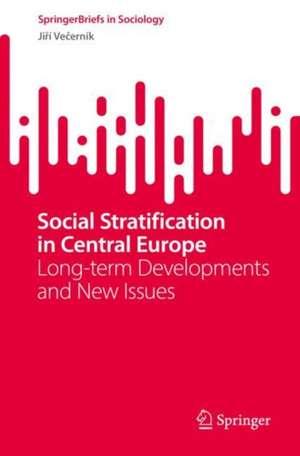Social Stratification in Central Europe: Long-term Developments and New Issues: SpringerBriefs in Sociology
Autor Jiří Večerníken Limba Engleză Paperback – sep 2022
Din seria SpringerBriefs in Sociology
-
 Preț: 380.07 lei
Preț: 380.07 lei -
 Preț: 347.36 lei
Preț: 347.36 lei -
 Preț: 444.35 lei
Preț: 444.35 lei -
 Preț: 379.86 lei
Preț: 379.86 lei -
 Preț: 381.21 lei
Preț: 381.21 lei -
 Preț: 378.54 lei
Preț: 378.54 lei -
 Preț: 376.59 lei
Preț: 376.59 lei -
 Preț: 447.62 lei
Preț: 447.62 lei -
 Preț: 379.68 lei
Preț: 379.68 lei -
 Preț: 380.25 lei
Preț: 380.25 lei -
 Preț: 361.03 lei
Preț: 361.03 lei -
 Preț: 175.76 lei
Preț: 175.76 lei -
 Preț: 379.86 lei
Preț: 379.86 lei -
 Preț: 413.45 lei
Preț: 413.45 lei -
 Preț: 375.45 lei
Preț: 375.45 lei -
 Preț: 413.84 lei
Preț: 413.84 lei - 15%
 Preț: 463.68 lei
Preț: 463.68 lei -
 Preț: 376.59 lei
Preț: 376.59 lei -
 Preț: 444.74 lei
Preț: 444.74 lei -
 Preț: 174.44 lei
Preț: 174.44 lei -
 Preț: 375.84 lei
Preț: 375.84 lei -
 Preț: 379.68 lei
Preț: 379.68 lei -
 Preț: 260.18 lei
Preț: 260.18 lei -
 Preț: 376.59 lei
Preț: 376.59 lei -
 Preț: 261.15 lei
Preț: 261.15 lei -
 Preț: 263.67 lei
Preț: 263.67 lei -
 Preț: 346.86 lei
Preț: 346.86 lei -
 Preț: 342.03 lei
Preț: 342.03 lei -
 Preț: 260.38 lei
Preț: 260.38 lei -
 Preț: 343.39 lei
Preț: 343.39 lei -
 Preț: 378.34 lei
Preț: 378.34 lei -
 Preț: 378.34 lei
Preț: 378.34 lei -
 Preț: 410.94 lei
Preț: 410.94 lei -
 Preț: 376.59 lei
Preț: 376.59 lei -
 Preț: 377.73 lei
Preț: 377.73 lei
Preț: 380.63 lei
Nou
Puncte Express: 571
Preț estimativ în valută:
72.83€ • 76.24$ • 60.62£
72.83€ • 76.24$ • 60.62£
Carte tipărită la comandă
Livrare economică 31 martie-14 aprilie
Preluare comenzi: 021 569.72.76
Specificații
ISBN-13: 9783031094576
ISBN-10: 3031094573
Pagini: 147
Ilustrații: XVI, 147 p. 17 illus. in color.
Dimensiuni: 155 x 235 mm
Greutate: 0.24 kg
Ediția:1st ed. 2022
Editura: Springer International Publishing
Colecția Springer
Seria SpringerBriefs in Sociology
Locul publicării:Cham, Switzerland
ISBN-10: 3031094573
Pagini: 147
Ilustrații: XVI, 147 p. 17 illus. in color.
Dimensiuni: 155 x 235 mm
Greutate: 0.24 kg
Ediția:1st ed. 2022
Editura: Springer International Publishing
Colecția Springer
Seria SpringerBriefs in Sociology
Locul publicării:Cham, Switzerland
Cuprins
- 1. Introduction: Countries, Datasets, and Themes in Focus. - 2. Regime Change and Developments in the Main Dimensions of Social Structure. - 3. The Development in Subjective Well-Being and Its Social Stratification. - 4. Setting Social Status in Couples and Partners’ Budgetary Discretion. - 5. Cultural Participation and Cultural Activities Stratified. - 6. Pre-retirement Socio-economic Status and Well-Being of Older Persons. - 7. Conclusion: New Opportunities for Empirical Research on Social Stratification. - Appendix.
Notă biografică
Jiří Večerník (1941) studied economics and sociology in Prague and Brno. Since 1990, he is a senior researcher at the Institute of Sociology of the Czech Academy of Sciences, the Department of Economic Sociology which he founded. Between 1991 and 1993, he was the editor-in-chief of the Czech Sociological Review and he launched its English edition which he edited again in 2002-2009. He cooperated with the Luxembourg Income Study, ILO, OECD and the European Commission. He published in the areas of labour market and social policies, income inequalities and poverty, subjective well-being and value orientations. He wrote or edited several comprehensive books about Czech society after 1990: Markets and People: The Czech Reform Experience in a Comparative Perspective (1995), Ten Years of Rebuilding Capitalism: Czech Society after 1989 (1999), Czech Society in the 2000s: A Report on Socio-Economic Policies and Structures (2009), Work, Values, Well-being: Czech Reality in a European Context (2016, in Czech).
Textul de pe ultima copertă
This book provides a comparative and contemporary account of social stratification in the Central European states of Czechia, Poland, Hungary, and Slovakia (the Visegrad Four – V4 group), and also by contrast with Austria. It looks at the shared history of these countries as part of the erstwhile Austro-Hungarian Empire. While the V4 states experienced, for decades, the regressive authoritarian Soviet rule, Austria escaped this fate. The question is how some common historical roots, impact of the communist regime, and transition paths have shaped the specific social structures of V4 countries which differ despite belonging to a relatively homogeneous region. The book examines the changes and developments through analyses of large comparative surveys and other data collected after 1990, most notably using the European Union’s survey “Statistics on Income and Living Conditions” (EU-SILC) that has been fielded since 2005. The book starts with an outline of the long-term developmentsin key social structure dimensions which occurred during the post-communist transition. The analytical chapters then discuss topics previously not much examined in social stratification perspective: subjective well-being, couples’ status, cultural activities and differences among retirees. This book is intended for social scientists working on stratification research, and, specifically, V4 societies and politics.
Caracteristici
Provides a unique comparative perspective on social stratification in Central European countries Uses large surveys so far not used in this research area Offers a comprehensive picture of development in the social structure of the region since 1990
